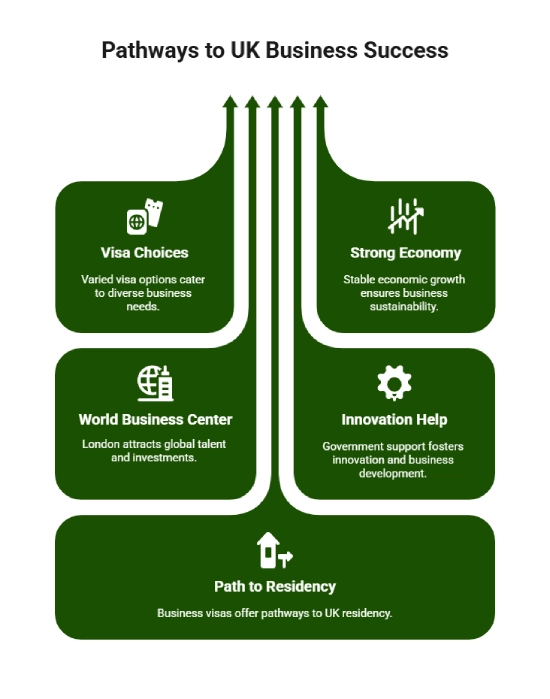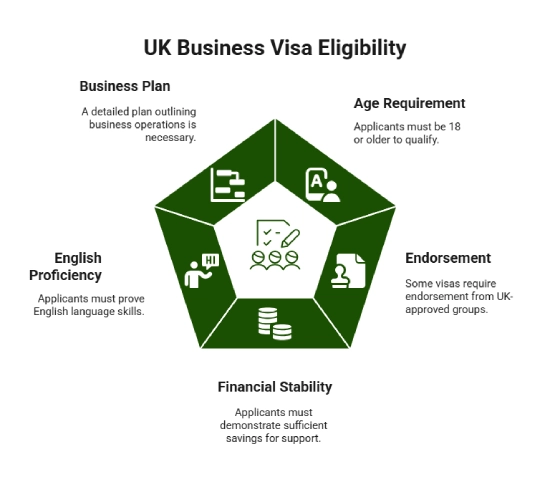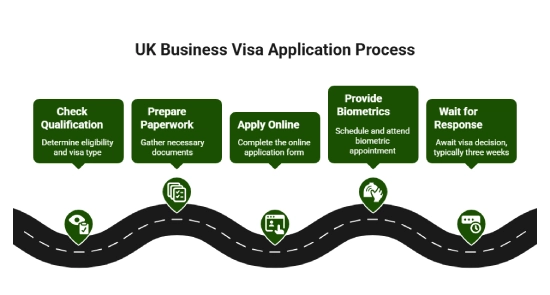UK Business Visa – Complete Guide for Entrepreneurs & Investors
The UK is a good place for business owners and investors who want to start or grow their operations. It has a strong economy and a helpful business community.
- Visa Choices: There are many types of visas for different business needs, from new companies to big ones.
- Strong Economy: The UK economy is expected to grow, which means a steady place for businesses.
- World Business Center: London is one of the top cities for business, bringing in talented workers and investments from around the world.
- Innovation Help: The government has programs and money available to help new ideas and businesses.
- Path to Living in the UK: Some business visas can lead to permanent residency and citizenship.

*Want to assistance to apply for the UK Business Visa? Sign up with Y-Axis for comprehensive support with the process.
What is a UK Business Visa?
A UK Business Visa lets people visit the UK for business reasons. This includes going to meetings or conferences, and negotiating deals. If you are in the UK to do business, you will likely need this visa. It allows you to take part in business actions. Depending on your visa and what you are doing, you can stay for up to 6 months each time.
With a UK Business visa, you can attend meetings and conferences, negotiate and sign contracts, site visits, board‑level meetings, internal training, and similar short‑term business activity. You cannot take up employment in the UK, do work that fills a UK role, or be self‑employed in the UK. However, certain Permitted Paid Engagements (PPE) are allowed when pre‑arranged (for example, invited speakers, visiting lawyers, artists, or sport professionals), but these have specific conditions.
Benefits of the UK Business Visa
The UK Business Visa offers several benefits. Some of them are given below.
- Market Access: Full entry to the UK market and a route into Europe.
- Networking: Join a varied business group and go to industry events.
- Infrastructure: Use top-tier infrastructure and business services.
- Talent Acquisition: Hire from a qualified and varied workforce.
- Legal Matters: Work within a reliable legal system that protects businesses.
Types of UK Business Visas
The UK has a range of business visas available, each designed for specific requirements and situations. The different types of UK Business Visas are given below.
- Innovator Founder Visa
- Global Talent Visa (Business Stream)
- Sole Representative Visa
- Business Visitor Visa
%20(1).webp)
Innovator Founder Visa
The UK Innovator Founder visa is for entrepreneurs with fresh, workable, and expandable business ideas who want to launch and manage their firms in the UK. It offers a way to live in the UK for up to three years, with chances to extend your stay and settle down if your business does well. The most needed thing is a sign-off from a certified group that says your business plan is valid.
Global Talent Visa (Business Stream)
The UK Global Talent Visa (Business Stream) lets very skilled people in tech, arts, science, and other areas work in the UK. They do not need a job offer or a sponsor. This visa is for people who are leaders or could become leaders in their fields, and who can show they have great talent and potential. They can apply to stay in the UK for good after 3 or 5 years. The time depends on whether they are seen as having talent that is exceptional or only potential.
Sole Representative Visa
The UK Sole Representative of an Overseas Business visa let a senior worker from a company abroad enter the UK to set up a UK branch or subsidiary. This visa is no longer available since April 11, 2022. It has been changed to the UK Expansion Worker visa under the Global Business Mobility route. People already in the UK with this visa can keep extending their stay and can apply to remain permanently after five years, if they meet the requirements.
Business Visitor Visa
The UK Business Visitor visa lets people come to the UK for a short time to do business. It usually lasts up to 6 months. But, it can also be given for 2, 5, or 10 years so people can visit more than once. Each visit can’t be longer than 6 months. This visa is for people who want to go to meetings or conferences, or see what business chances there are in the UK. It's not for people who want to find a job or start a business that will stay there for a long time.
Eligibility Criteria for UK Business Visa Applicants
The eligibility criteria for the UK Business Visa are given below.
- Age: Applicants must be 18 or older.
- Endorsement: Some visas require an endorsement from a UK-approved group.
- Finances: You need to show you have enough savings to support yourself while you are here.
- English: You must be able to speak English well, with proof from tests or qualifications.
- Business Plan: You should provide a business plan that shows what your business will do and how it will function.

Document Requirements
The documents required to apply for the UK Business Visa are given below.
- Passport: A current passport or another form of acceptable travel ID.
- Endorsement Letter: If needed, a letter from a recognized endorsing organization.
- Financial Records: Bank statements, payslips or official employment letters
- English Language Proof: Certificates from accepted English tests.
- Business Plan: A full plan that shows your business is innovative, able to succeed, and able to grow.
- Demonstrate strong ties to your home country: Submit proof such as property ownership, ongoing employment, or family commitments, to establish intent to return.
UK Business Visa Application Process
The application process for the UK Business Visa is given below.
Step 1: Check if you qualify: Find the correct visa type and make sure you meet all the rules.
Step 2: Get your paperwork ready: Collect all the documents you need.
Step 3: Apply online: Fill out the visa form on the official UK government site.
Step 4: Give your biometric data: Book an appointment to give your fingerprints and photo.
Step 5: Wait for a response: After you apply, wait for the visa people to decide. It usually takes three weeks for applications from outside the UK.

Visa Fees and Estimated Costs
Detailed information about the application fees for UK Business Visa is given below.
| Visa Type | Fee (GBP) | Maximum Stay per Visit |
| Standard Visitor (up to 6 months) | £127 | Up to 6 months |
| Long-term Standard Visitor – 2 years | £475 | Up to 6 months each visit |
| Long-term Standard Visitor – 5 years | £848 | Up to 6 months each visit |
| Long-term Standard Visitor – 10 years | £1,059 | Up to 6 months each visit |
UK Business Visa Processing Time
Detailed information about the processing times for various types of UK Business Visa is given below.
| Service Type | Processing Time |
| Standard Visitor Visa | Up to 3 weeks |
| Priority Service (extra fee) | 5 working days |
| Super Priority Service | Decision by end of next working day, if eligibility allows |
Can You Include Family Members?
Yes, family members can be included in a UK business visa application. Usually, the primary person's spouse or partner and children under 18 can be added as dependents. These family members must ask for their own visas as dependents of the main person.
Pathway to Permanent Residency and British Citizenship
Some business visas let you apply to remain in the UK for an unlimited time (called Indefinite Leave to Remain, or ILR):
- Innovator Founder Visa: You can apply for ILR after 3 years if you meet all the requirements.
- Global Talent Visa: How long it takes depends on your endorsement. You can apply after 3 or 5 years.
Once you have ILR, you can apply to become a British citizen if you meet the rules about how long you have lived in the UK.
Extension, Renewal, or Switching Visas
- Extensions: Some visas, such as the Innovator Founder Visa, can be extended.
- Switching: You might be able to change to a different visa while you are in the UK, if you meet the requirements.
- Renewals: Submit your renewal applications before your current visa runs out.
How Can Y-Axis Help You?
Y-Axis is a trusted immigration consultancy in the UK with more than 25 years of experience helping business owners and investors with UK Business Visas. Our team offers complete support so your application goes smoothly.
Our services include:
- Assessing if you qualify and advising you on the best visa options.
- Creating a solid business plan that meets requirements.
- Walking you through paperwork and the submission process.
- Getting endorsements from UK-approved organizations.
- Visa extensions and bringing your family to the UK.
Looking for Inspiration
Explore what Global Citizens have to say about Y-Axis in shaping their future
Frequently Asked Questions
